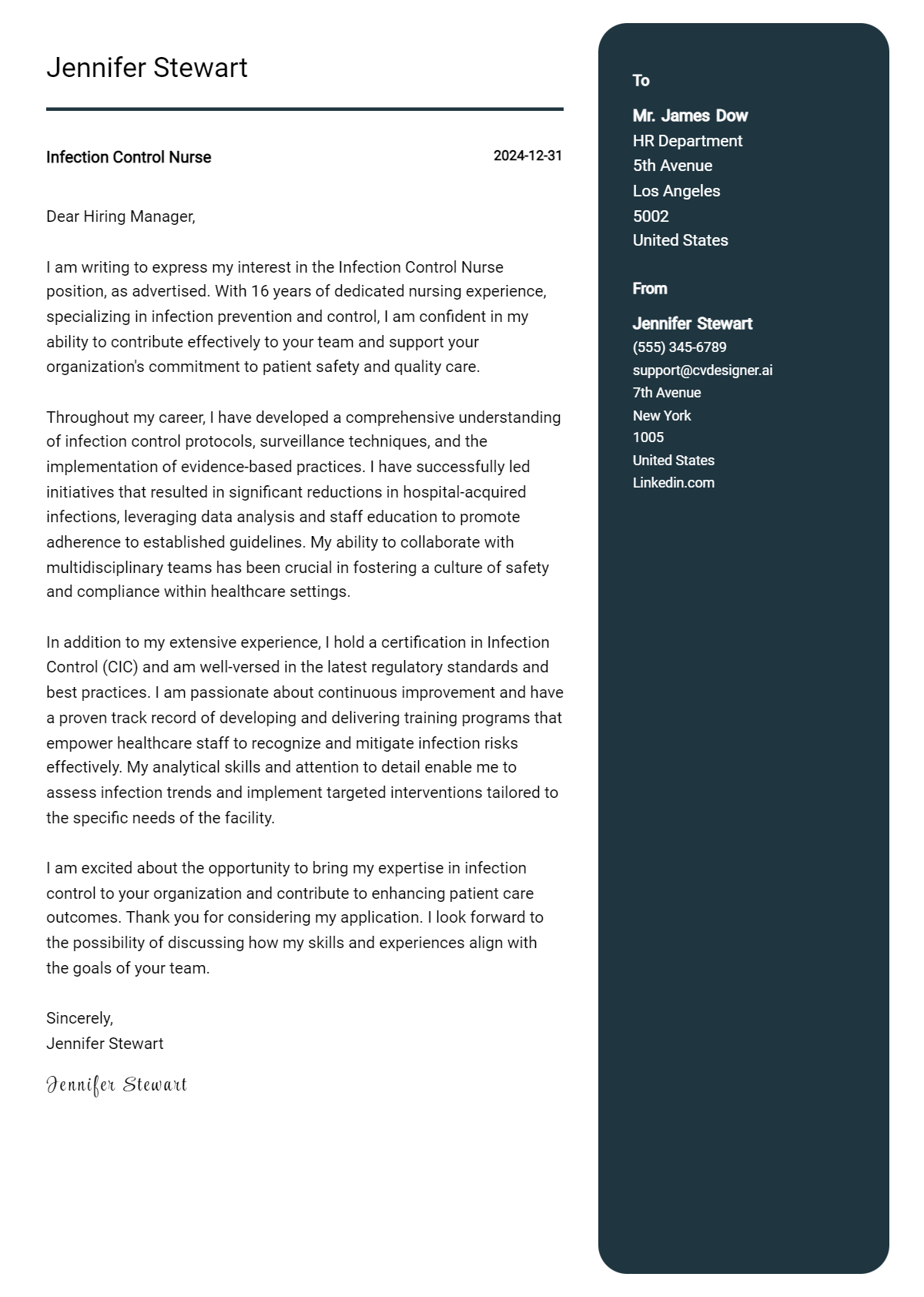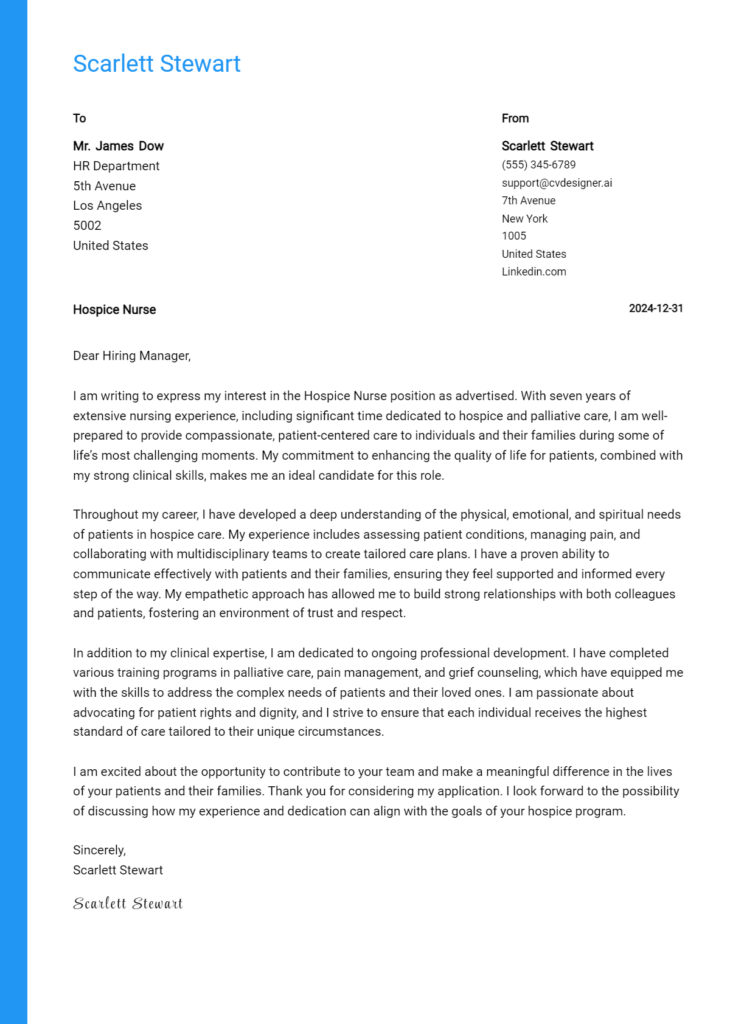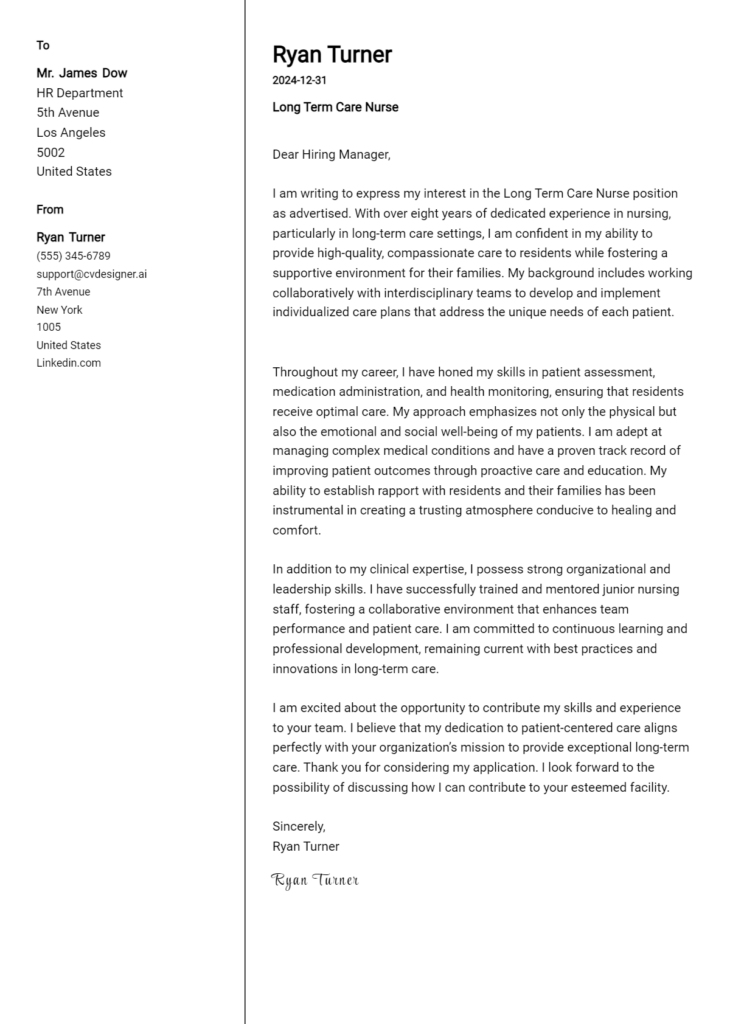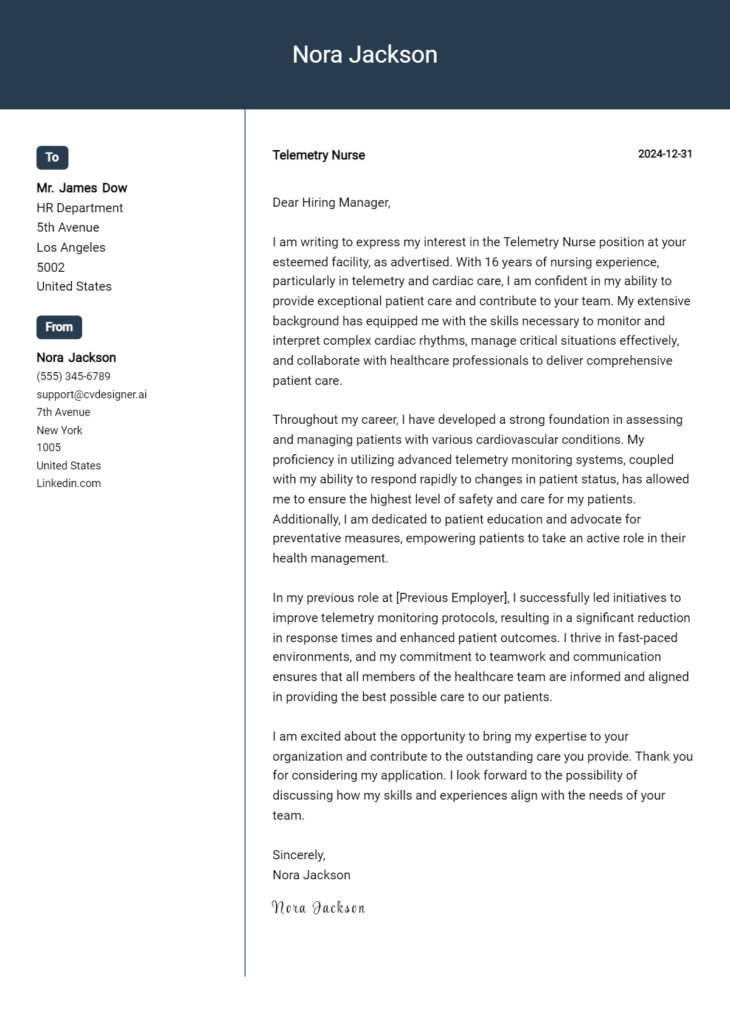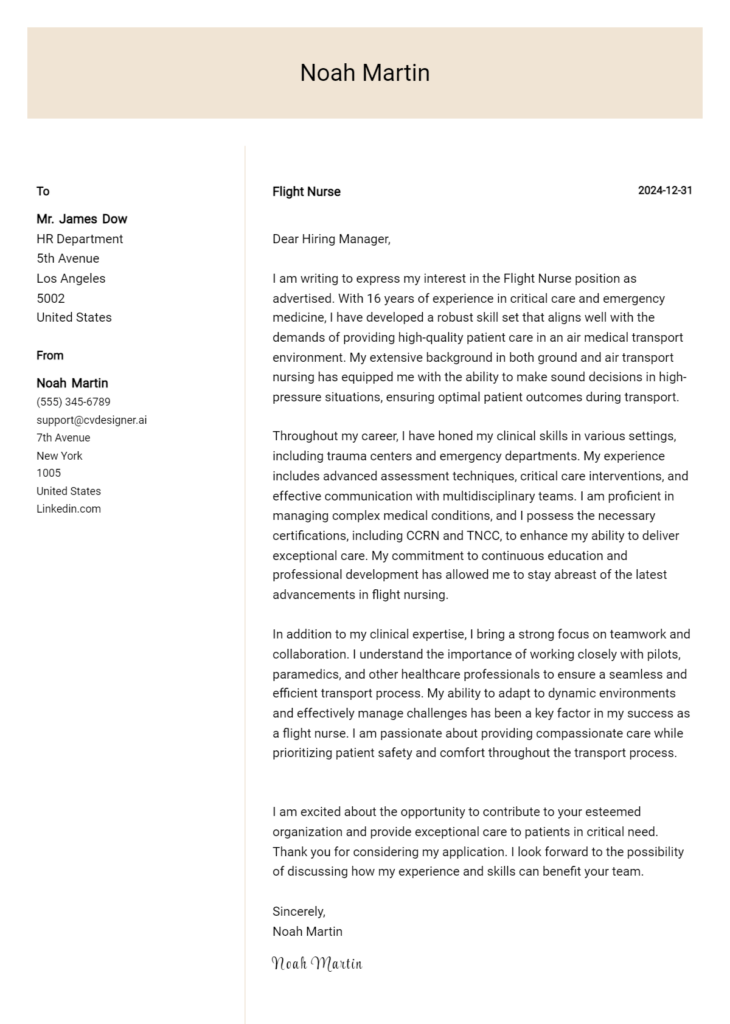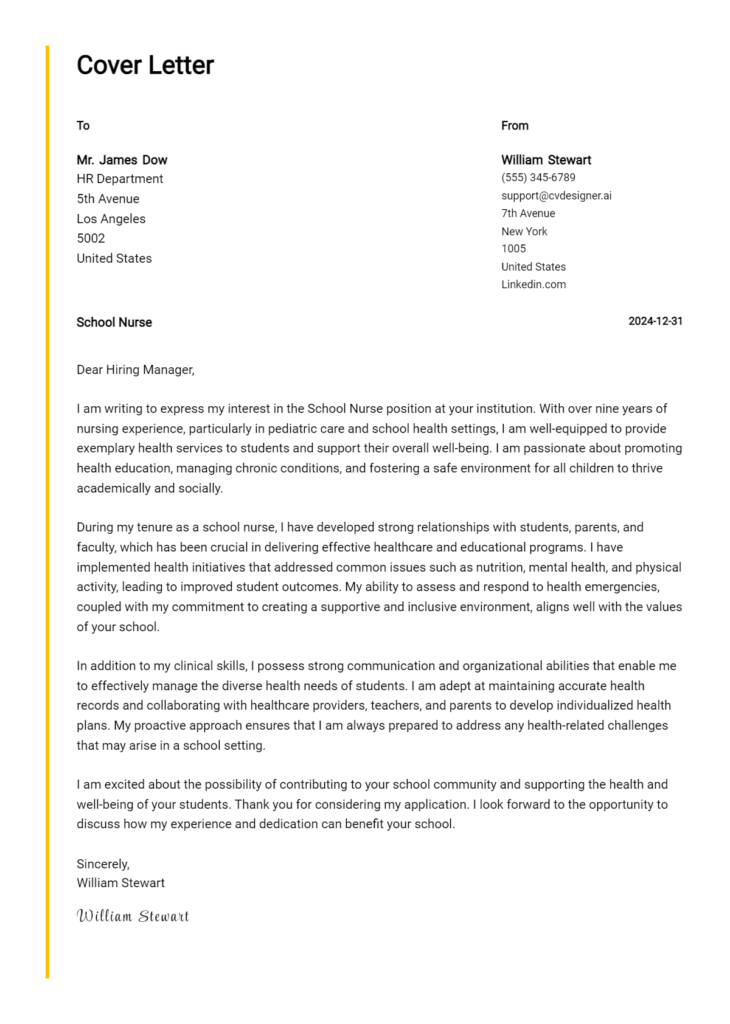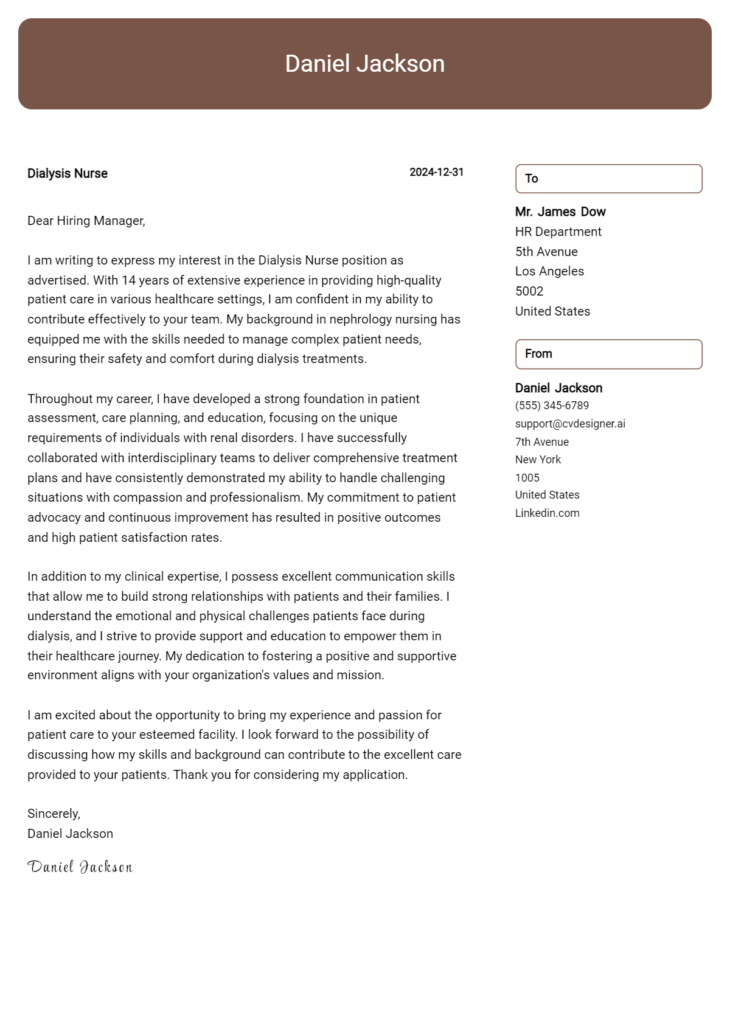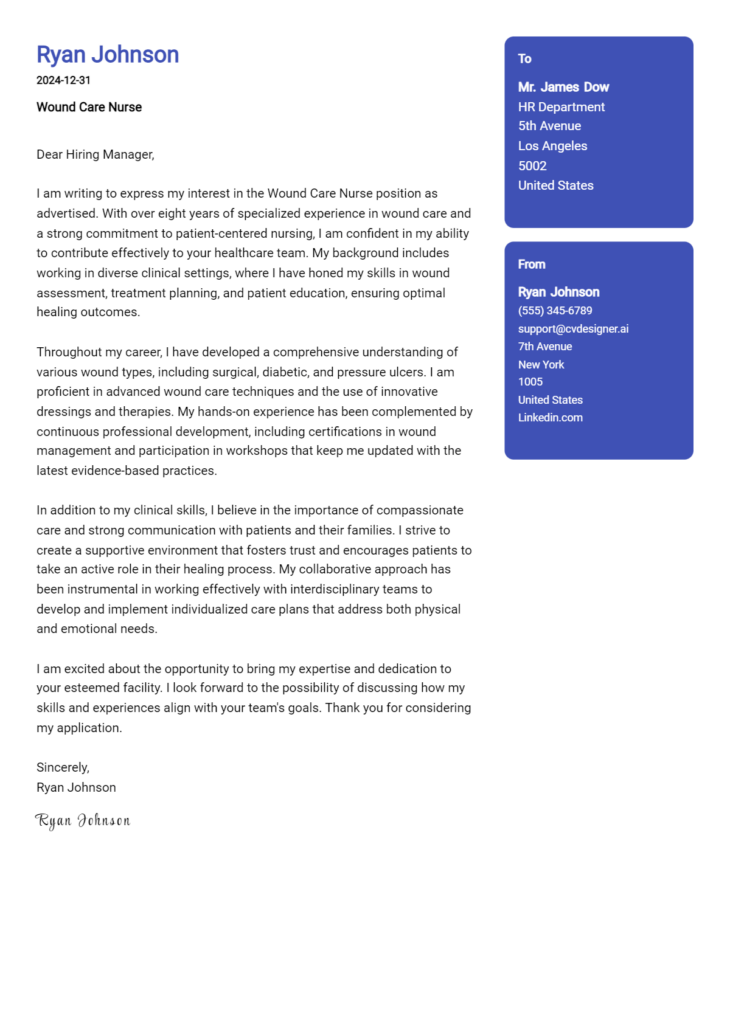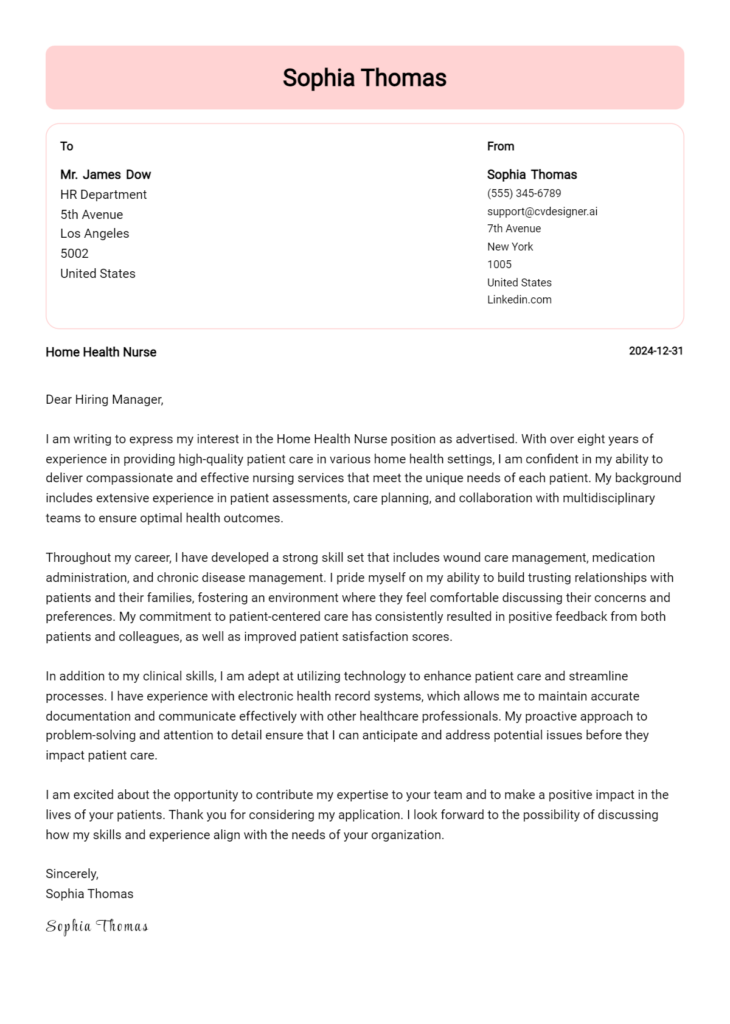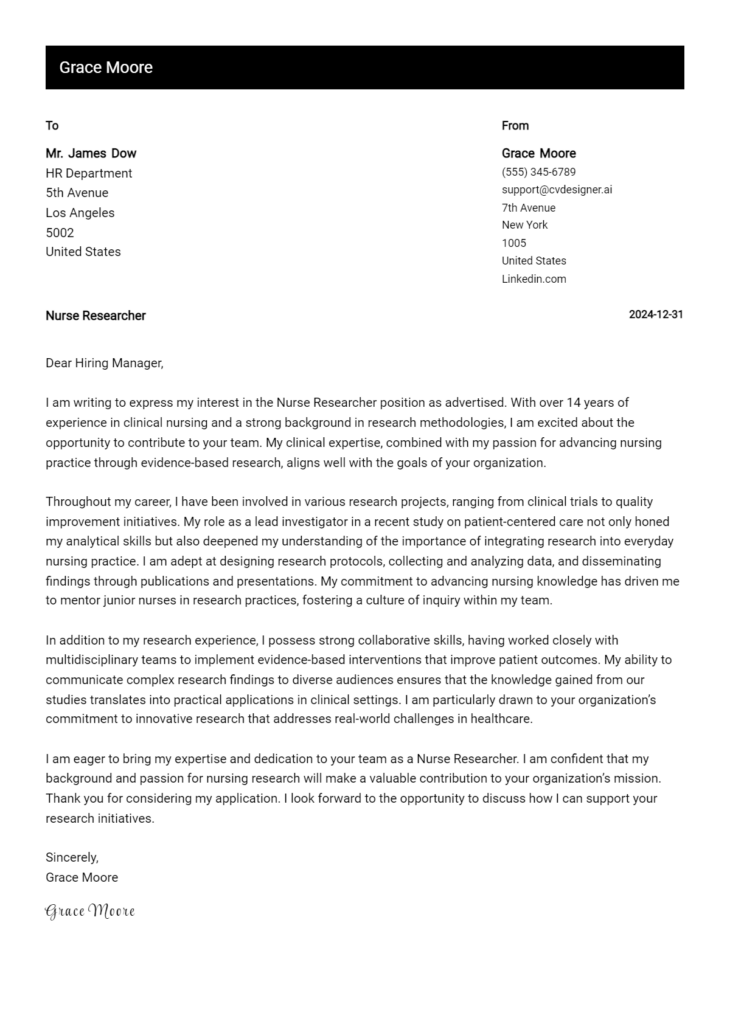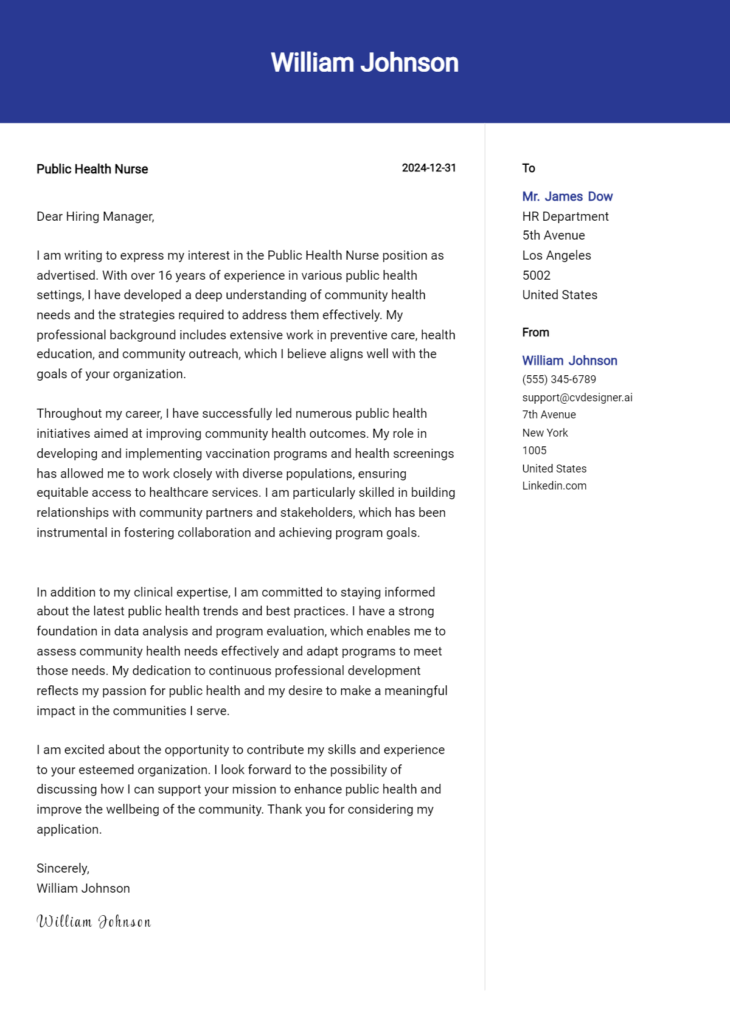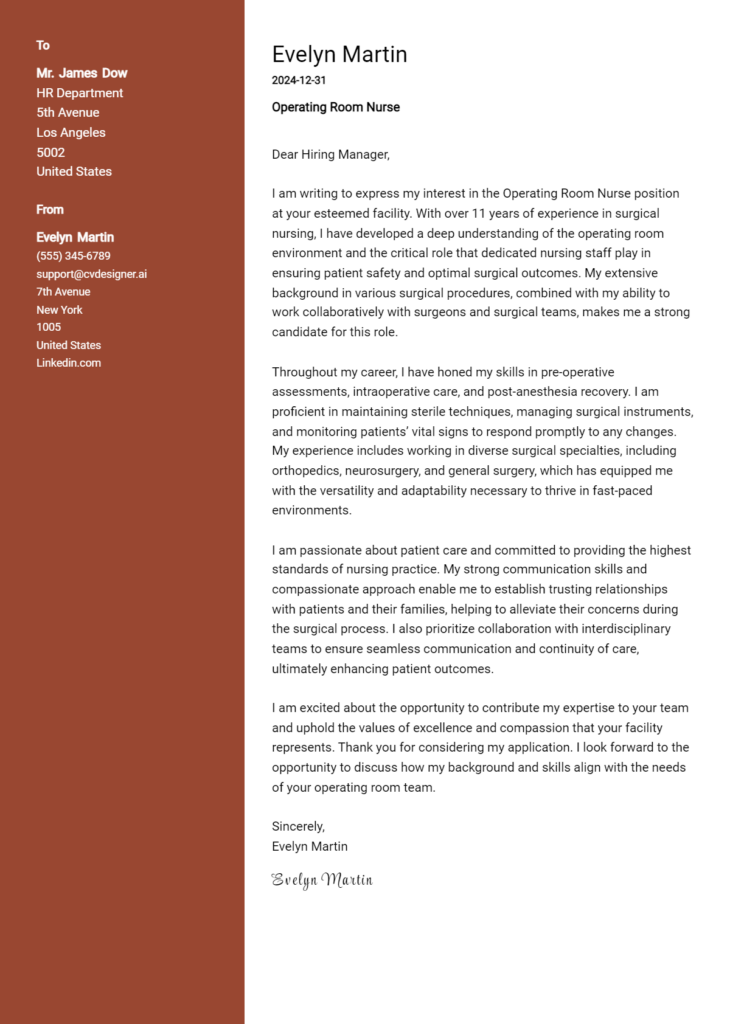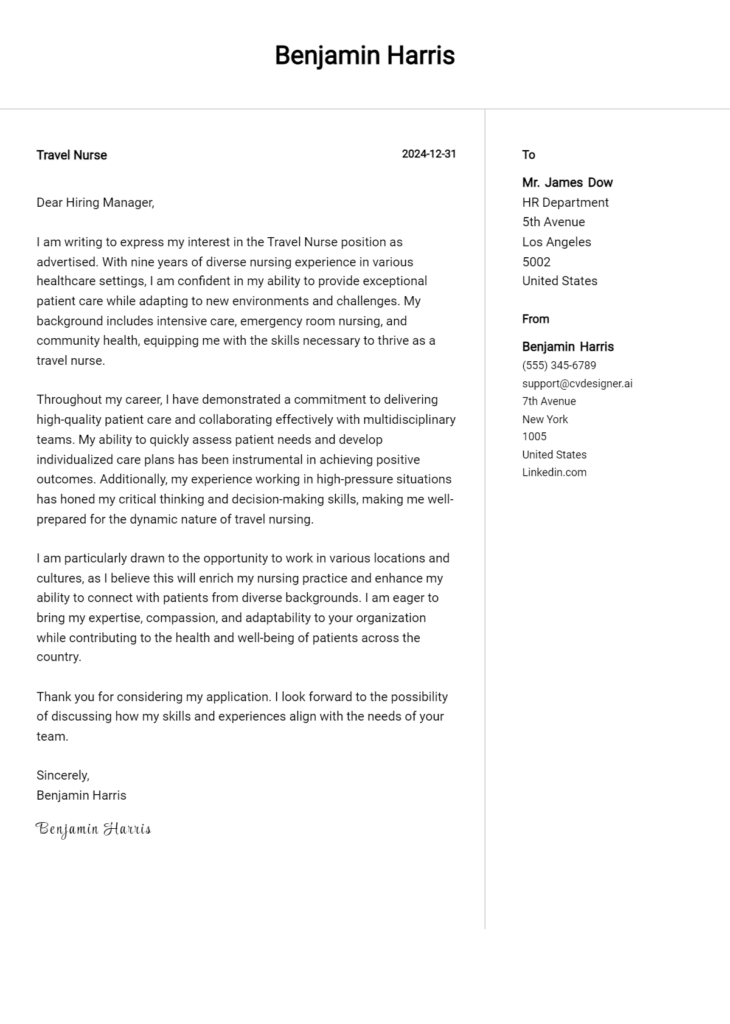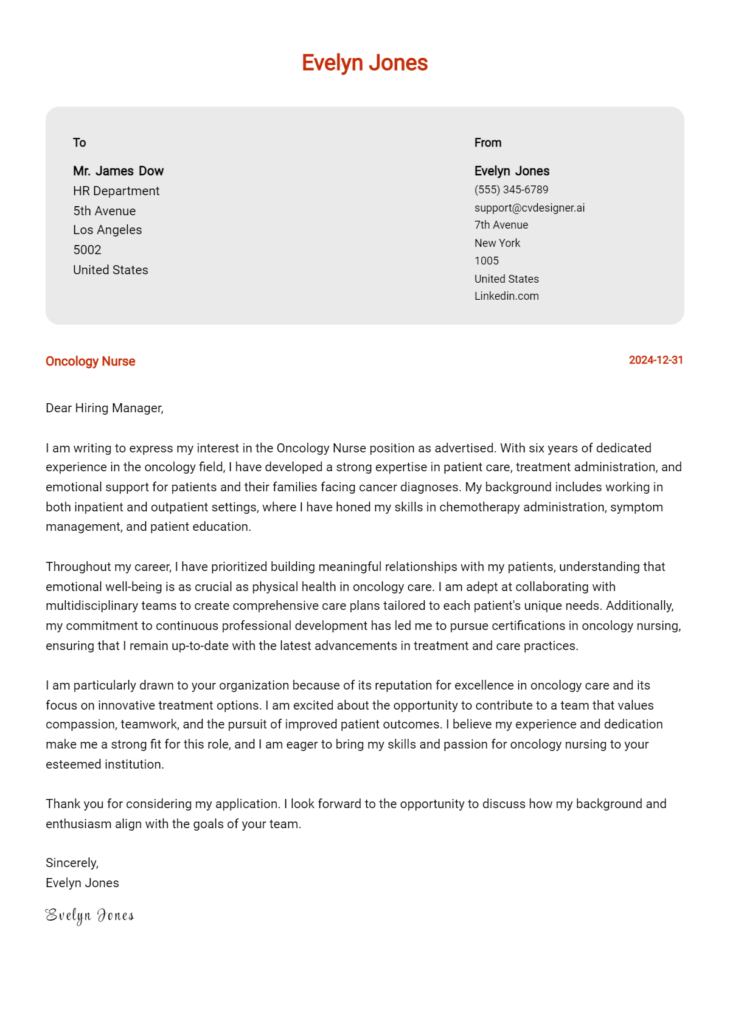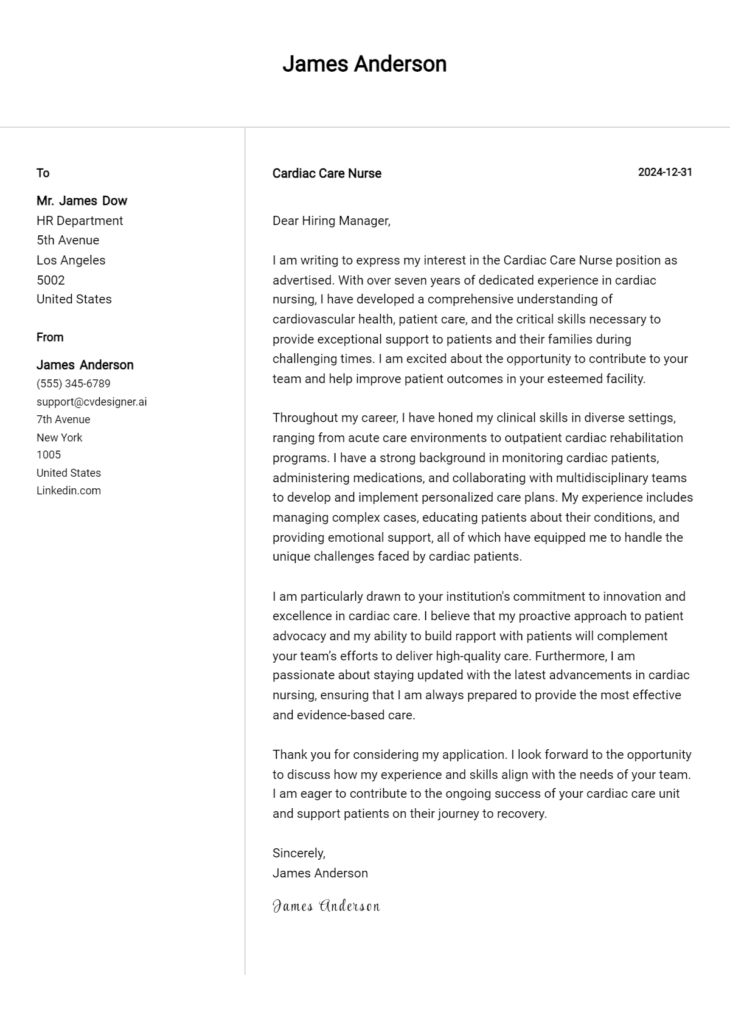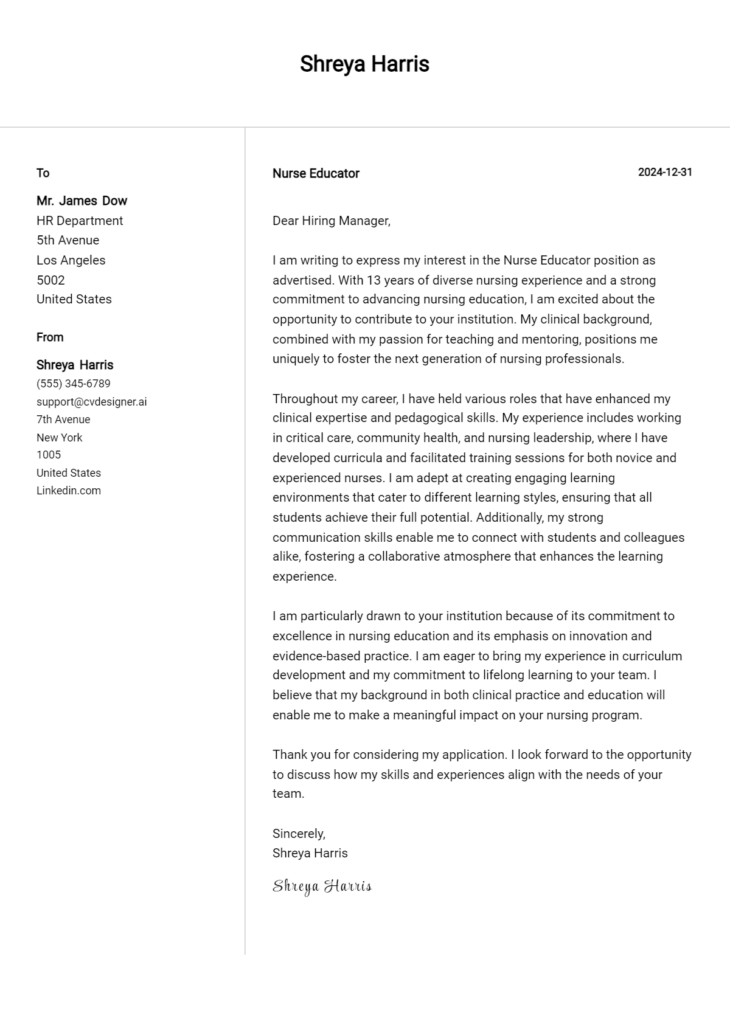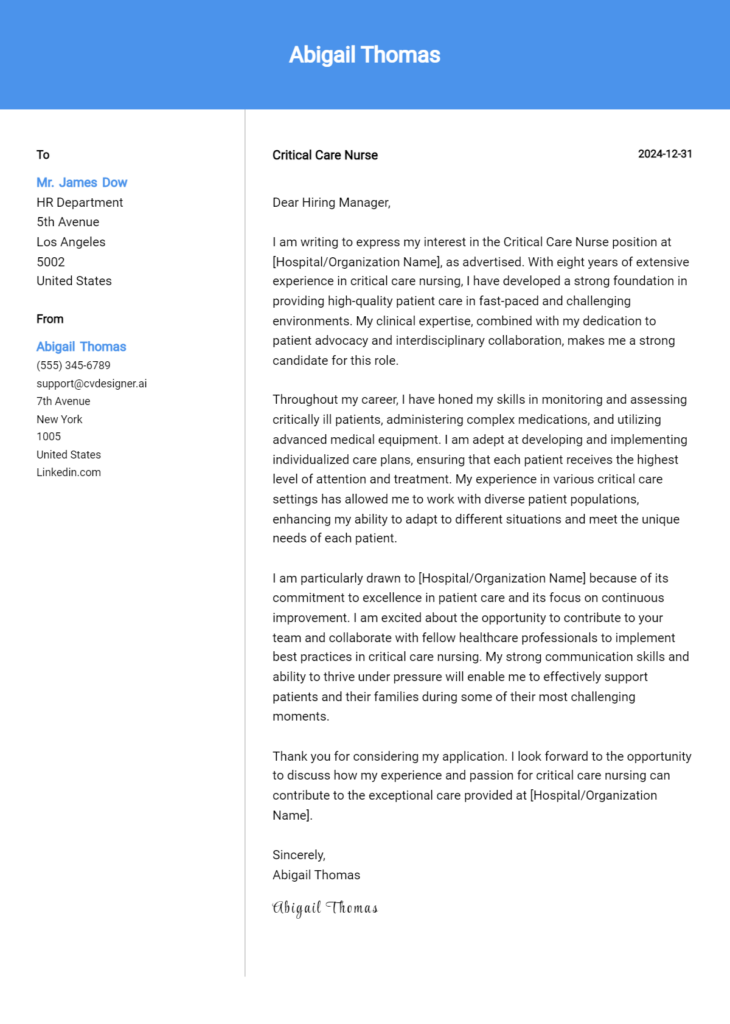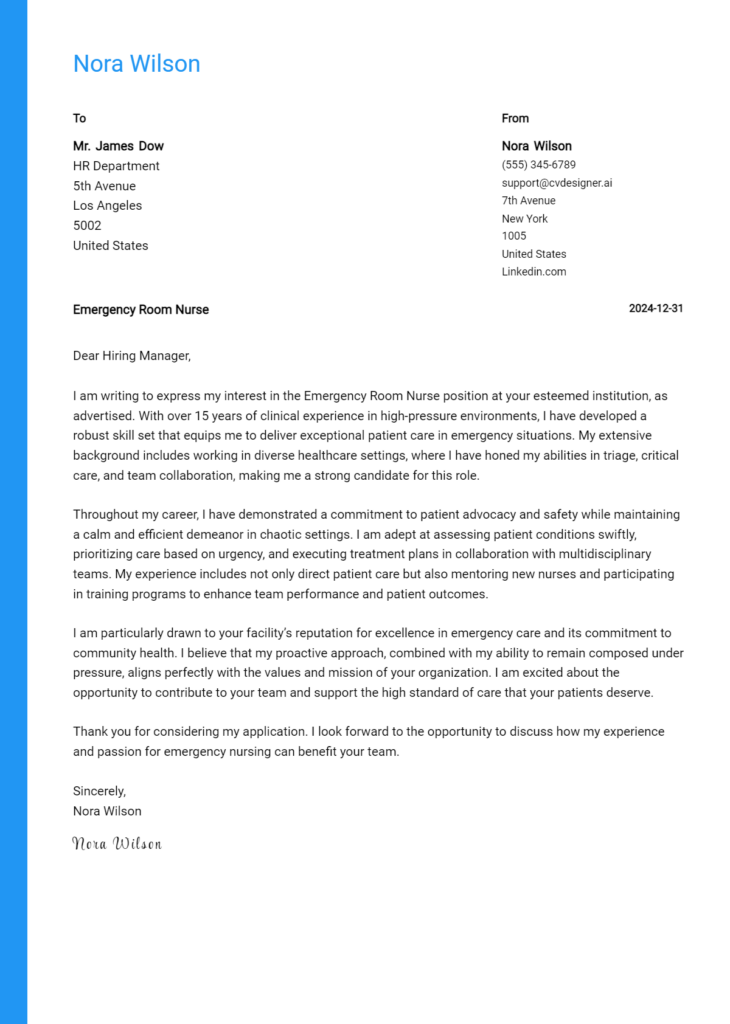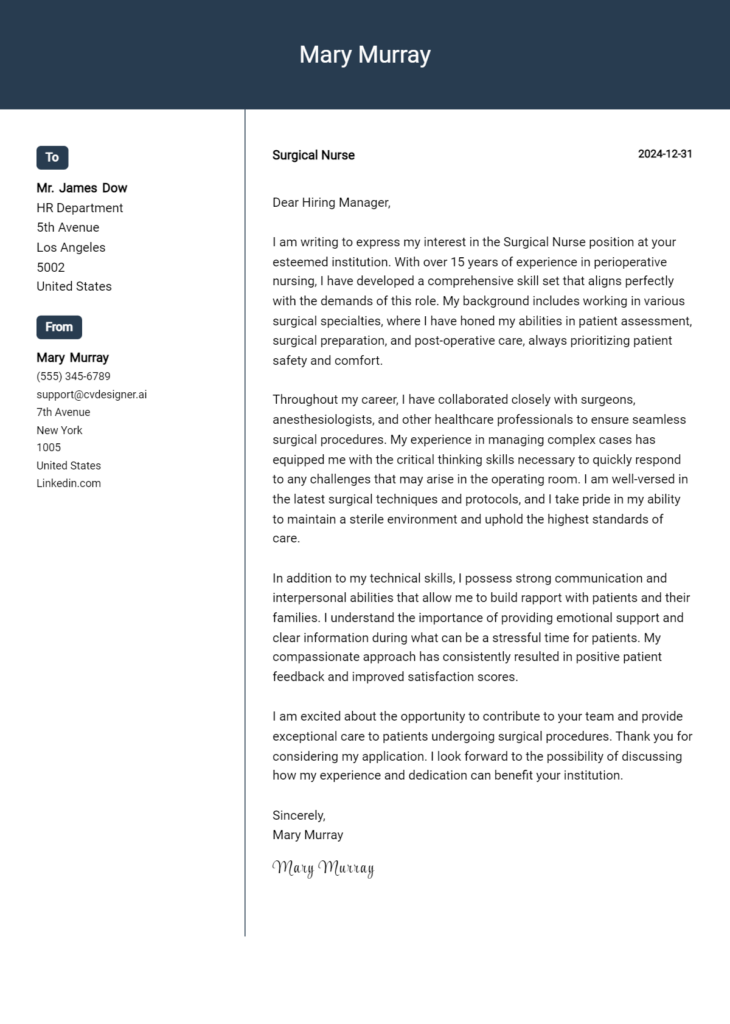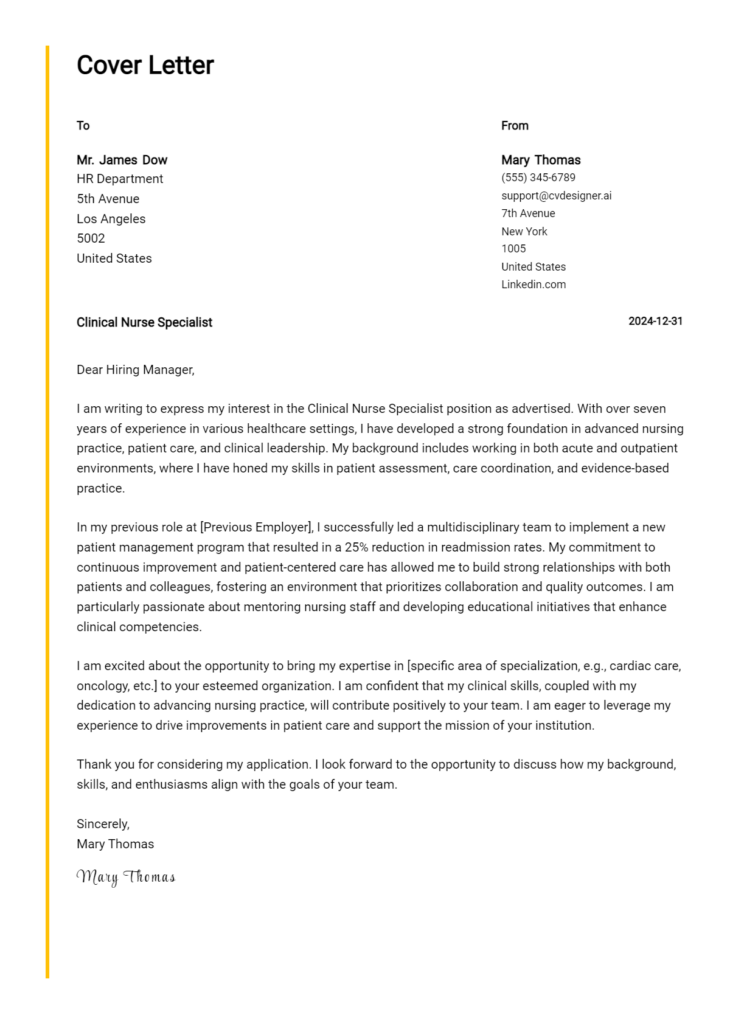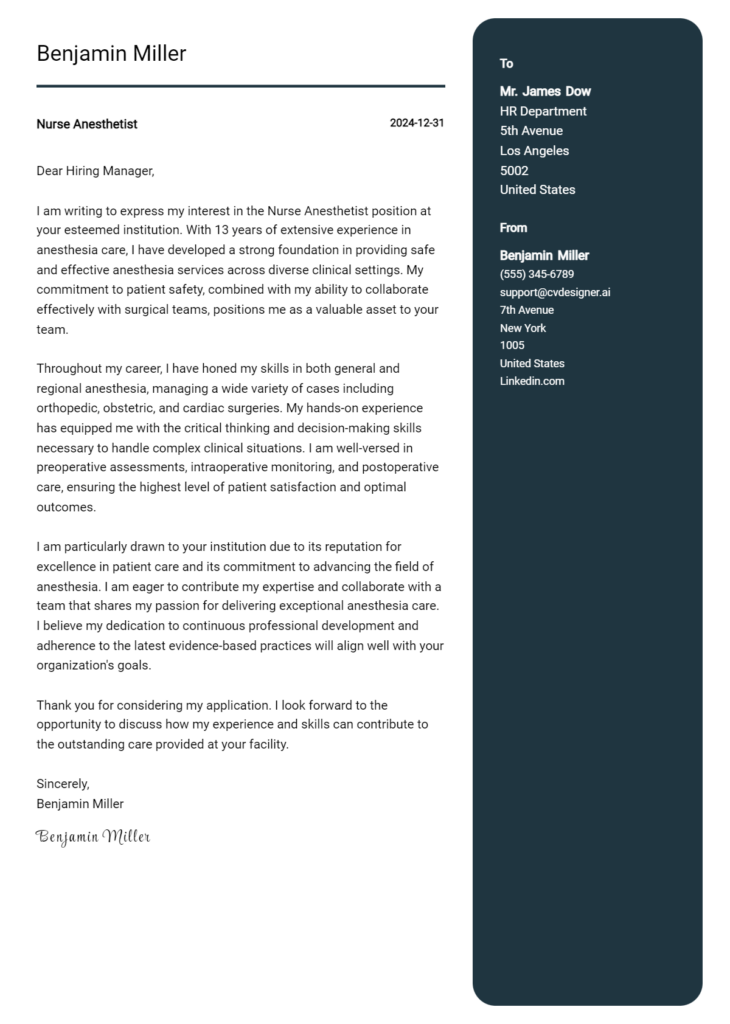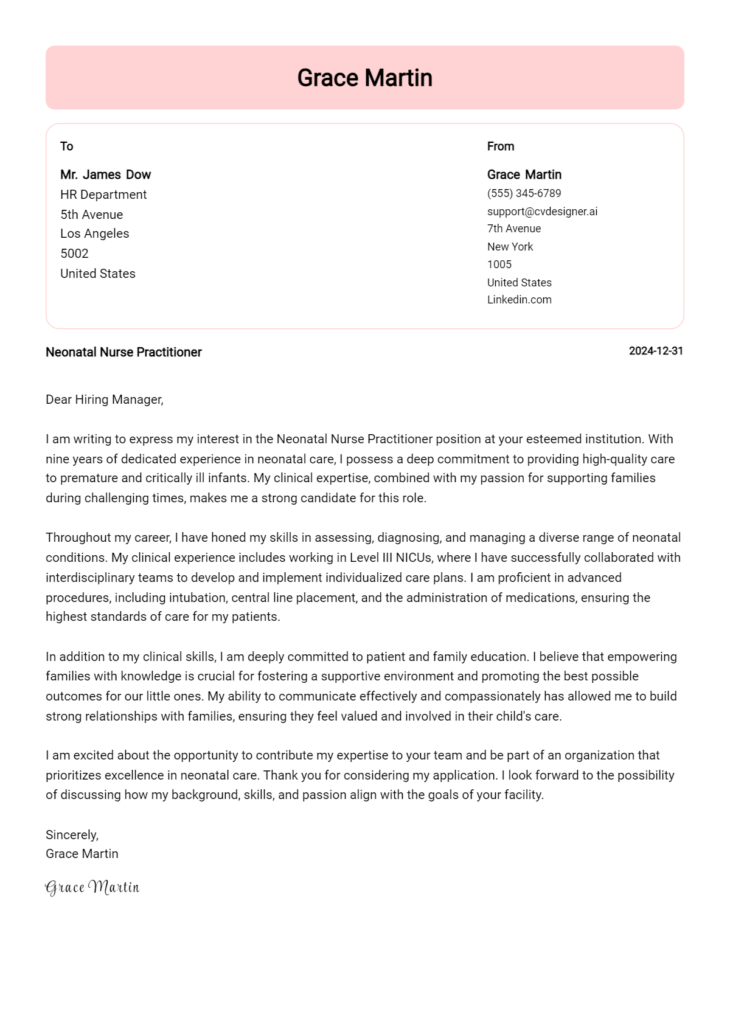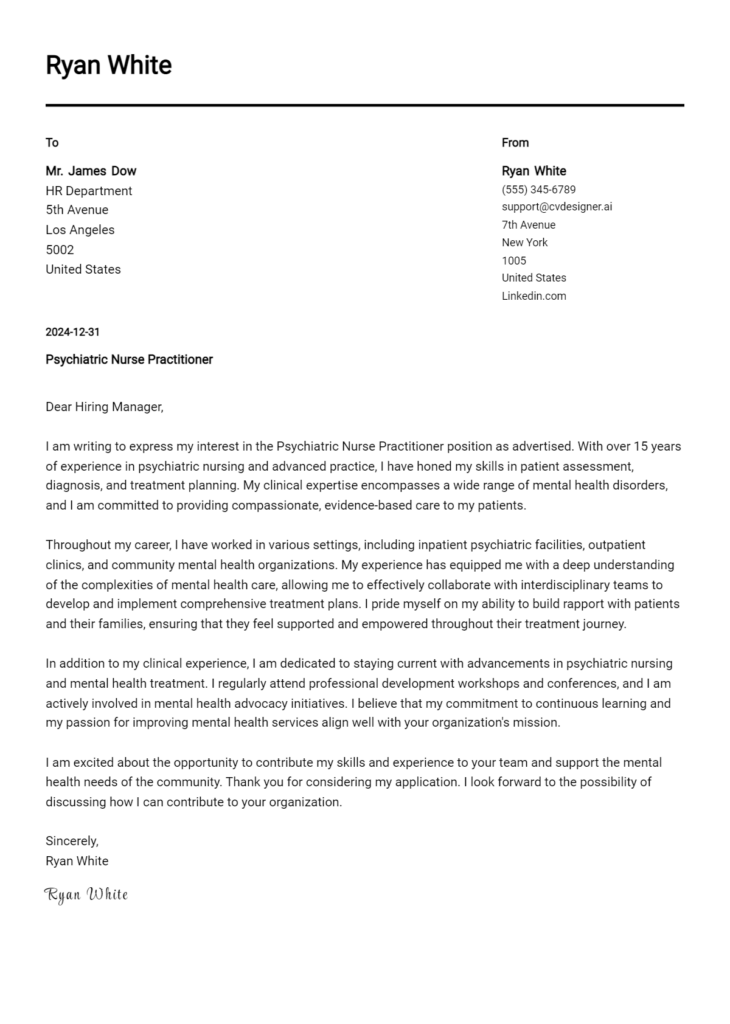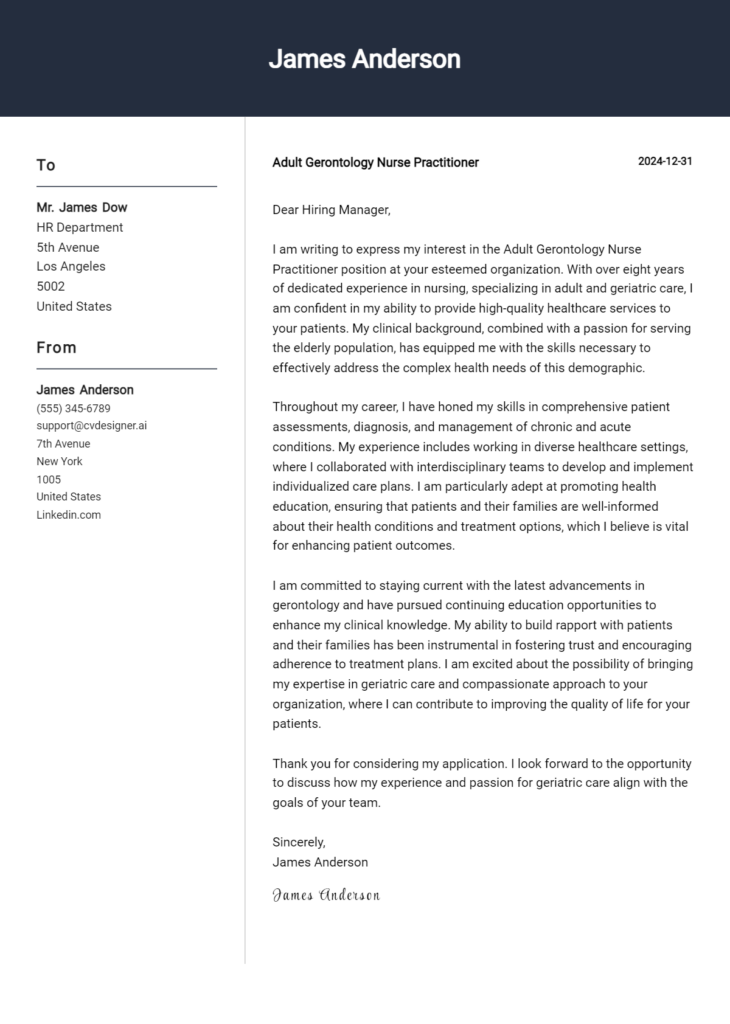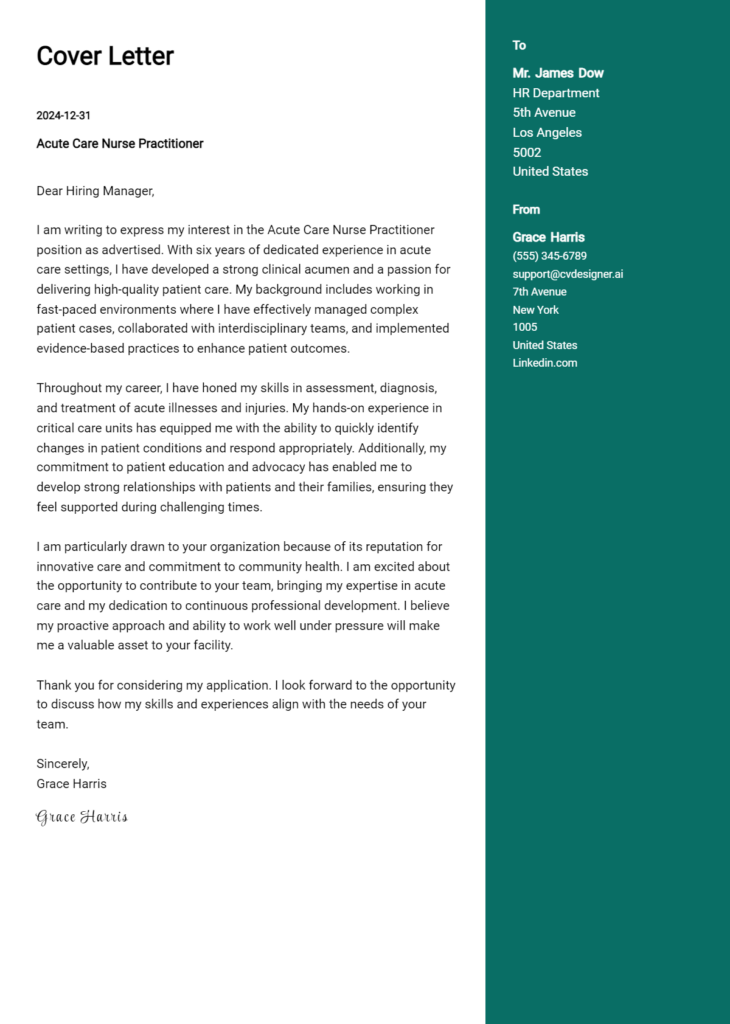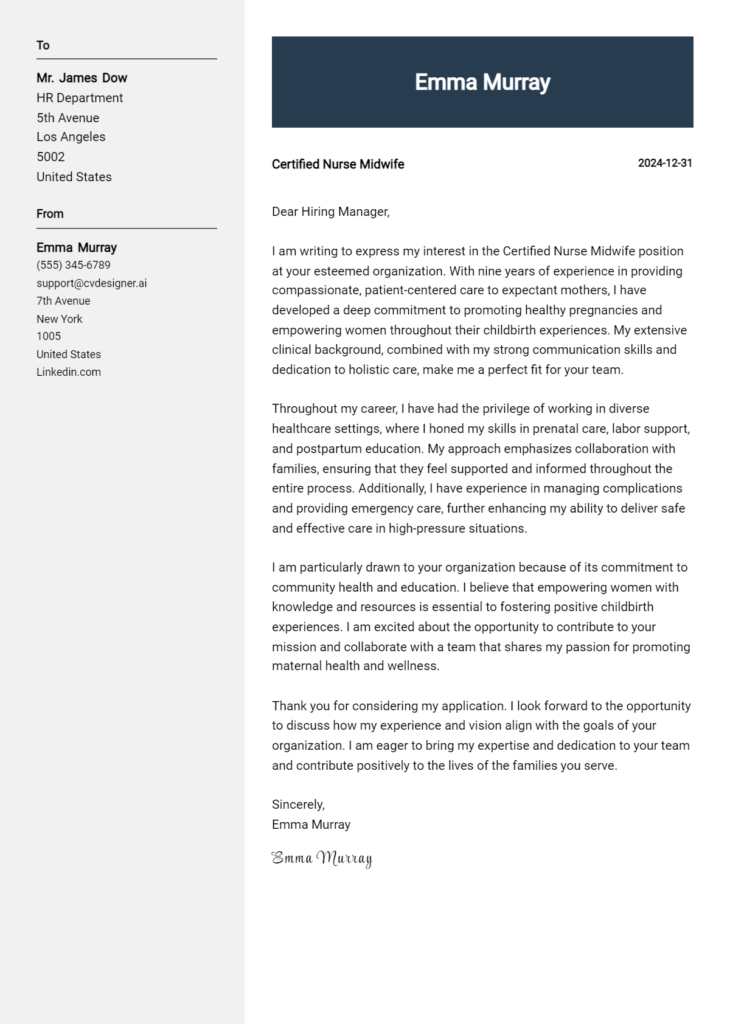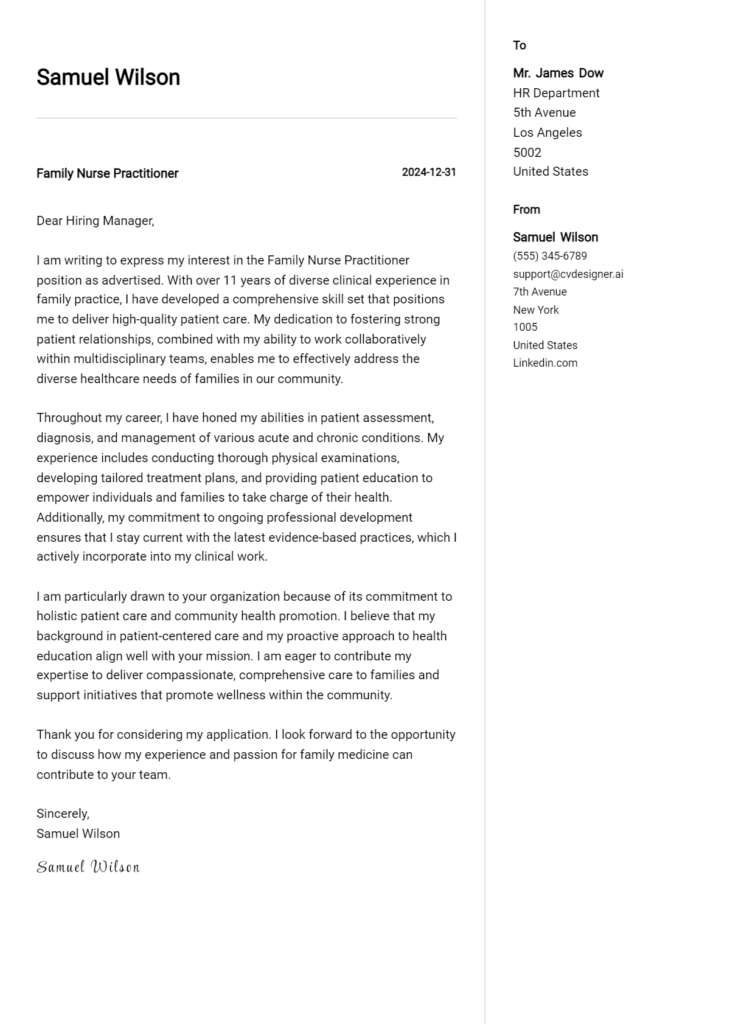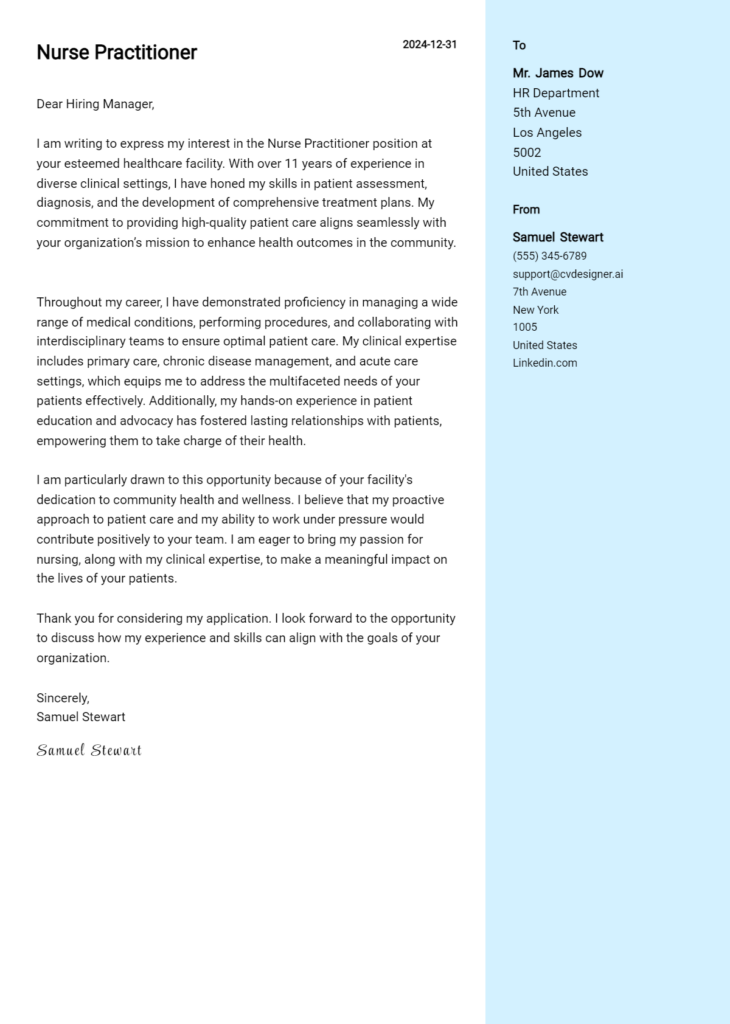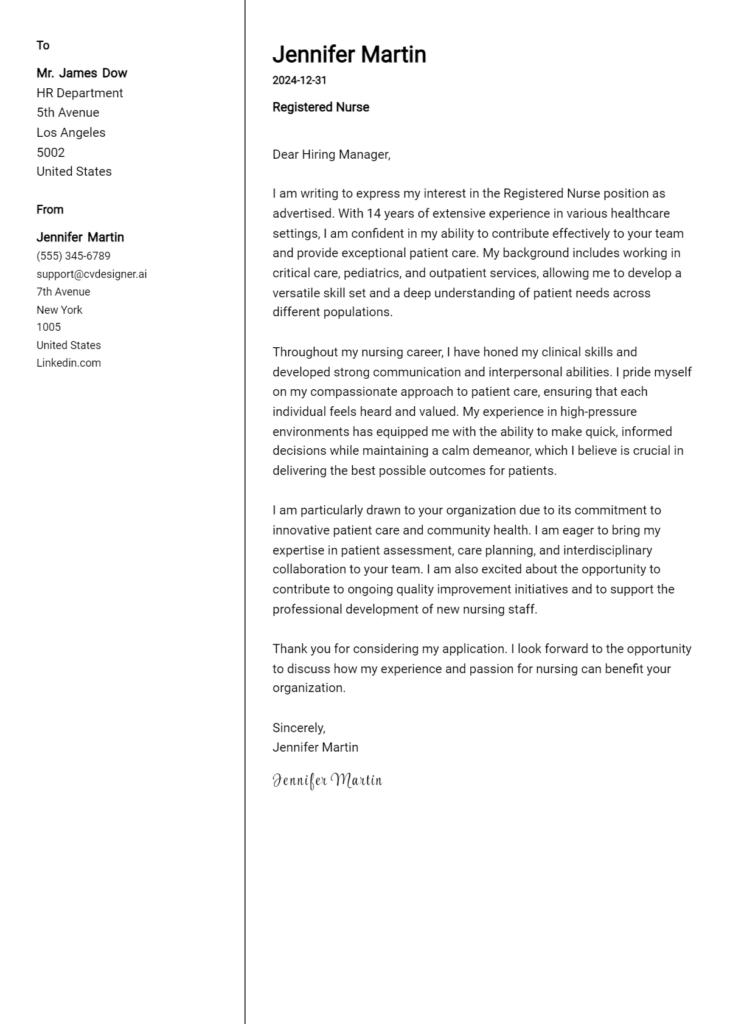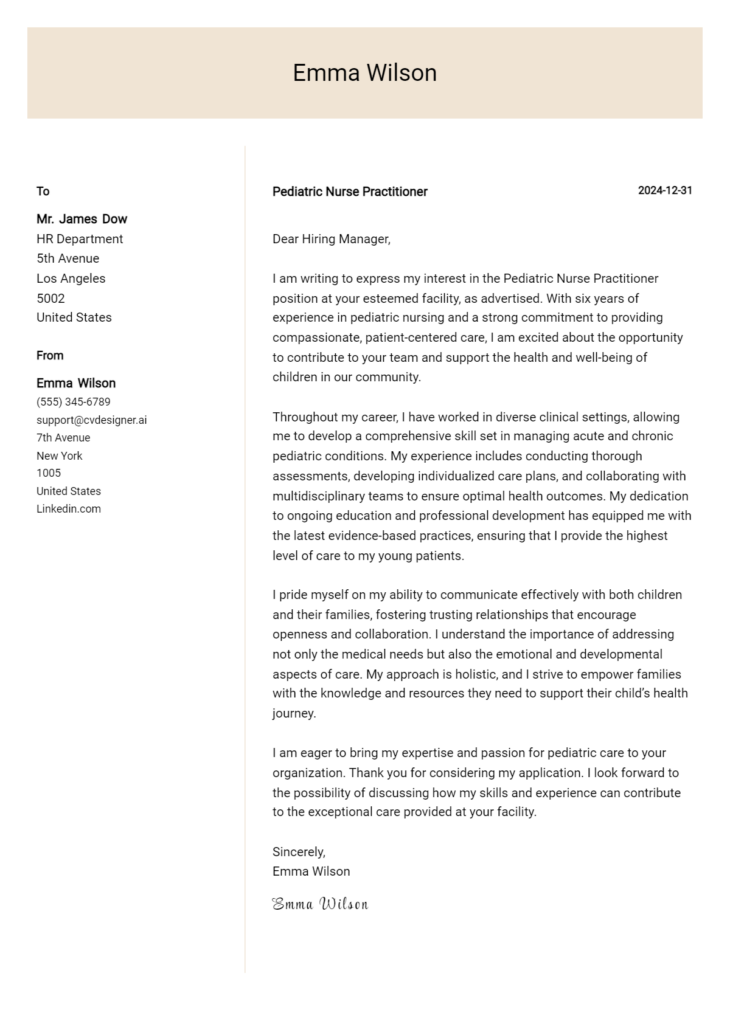Infection Control Nurse Cover Letter Examples
Explore additional Infection Control Nurse cover letter samples and guides and see what works for your level of experience or role.
How to Format an Infection Control Nurse Cover Letter
Crafting an effective cover letter is a crucial step in the job application process for an Infection Control Nurse. In this specialized field, the way you present your skills and experience is essential, as it demonstrates your commitment to patient safety and your ability to adhere to rigorous health standards. The structure of your cover letter not only captures the hiring manager's attention but also showcases your professionalism and meticulous nature—key attributes for any infection control specialist.
In this guide, we’ll outline how to format your cover letter, providing insights and examples tailored to the nursing profession.
We’ll focus on the essential components of a professional cover letter, including:
- Cover Letter Header
- Cover Letter Greeting
- Cover Letter Introduction
- Cover Letter Body
- Cover Letter Closing
Each section is vital in emphasizing your qualifications and dedication to infection control. Let’s delve into each part and explore how to make your cover letter truly stand out in the nursing field.
Importance of the Cover Letter Header for an Infection Control Nurse
The cover letter header is a critical component of your application as an Infection Control Nurse, serving as the first impression of your professionalism and attention to detail. A well-structured header should include your contact information, the date, and the recipient's details, ensuring clear communication from the outset. Clarity in the header not only reflects your organizational skills but also provides the hiring manager with essential information to reach you easily. A strong header can enhance your application, while a weak one may detract from your qualifications.
Strong Example
Jane Doe, RN, BSN 123 Health St. Cityville, ST 12345 jane.doe@email.com (123) 456-7890 March 15, 2023 Hiring Manager XYZ Hospital 456 Care Rd. Cityville, ST 12345
Weak Example
jane d. 123 health street Cityville, ST March 15, 2023 XYZ Hospital
The Importance of the Cover Letter Greeting for Infection Control Nurse
The greeting of a cover letter serves as the first impression an applicant makes on a potential employer, setting the tone for the entire correspondence. A well-crafted greeting that addresses the hiring manager directly demonstrates professionalism and personalizes the communication, showing the applicant's genuine interest in the position. Avoiding generic salutations is crucial; they can make the letter feel impersonal and unengaging. Taking the time to research the recipient's name not only reflects attention to detail but also creates a connection with the reader. A personalized greeting can significantly enhance the overall effectiveness of the cover letter.
Strong Greeting Example
Dear Ms. Johnson,
Weak Greeting Example
To Whom It May Concern,
The Importance of a Well-Crafted Cover Letter Introduction for an Infection Control Nurse
The cover letter introduction serves as the first impression for potential employers, making it crucial for candidates to create a compelling opening that captures the hiring manager's attention. For an Infection Control Nurse, this introduction should not only express genuine interest in the role but also highlight relevant skills and achievements that demonstrate the candidate's qualifications. A strong introduction sets the tone for the rest of the cover letter and encourages the reader to consider the applicant as a strong contender for the position. Below are examples of both strong and weak introductions to illustrate how effective writing can impact a candidate's chances.
Strong Example
Dear [Hiring Manager's Name], I am excited to apply for the Infection Control Nurse position at [Hospital/Organization Name], where my extensive experience in infection prevention and control, coupled with a passion for patient safety, can contribute to your team’s mission. With over five years of dedicated service in acute care settings, I have successfully implemented evidence-based practices that reduced hospital-acquired infections by 30%. I am eager to bring my expertise in surveillance, education, and compliance to [Hospital/Organization Name] and help further enhance your exemplary healthcare standards.
Weak Example
To whom it may concern, I am writing to apply for the Infection Control Nurse position. I have some nursing experience, and I think I could do the job. I know about infection control but haven’t really done much in that area. I hope you consider my application.
Purpose of the Cover Letter Body for an Infection Control Nurse
The body of a cover letter for an Infection Control Nurse is essential in conveying the candidate's specialized skills, relevant experiences, and overall value to the healthcare organization. This section provides an opportunity to highlight specific projects, such as successful implementation of infection prevention protocols, participation in outbreak investigations, or education programs for staff and patients. By detailing accomplishments, the candidate not only demonstrates their expertise in infection control but also showcases their commitment to enhancing patient safety and improving healthcare outcomes. A well-crafted cover letter body can distinguish a candidate from others by clearly articulating how their background aligns with the organization's mission and goals.
Strong Example
Dear Hiring Manager, I am excited to apply for the Infection Control Nurse position at [Hospital Name]. With over six years of experience in infection prevention and control, I have successfully led initiatives that reduced hospital-acquired infections by 30% over two years. My role in the implementation of a hand hygiene compliance program not only improved staff adherence rates but also fostered a culture of safety within the unit. Additionally, I collaborated with interdisciplinary teams during a recent outbreak investigation, which resulted in the swift containment of the infection and the development of a robust response protocol. My dedication to ongoing education is reflected in my certification as a Certified Infection Control (CIC) professional, and I am eager to bring my expertise to your esteemed institution. Sincerely, [Your Name]
Weak Example
Dear Hiring Manager, I am writing to apply for the Infection Control Nurse position. I have worked in nursing for several years and have some experience in infection control. I think I could do a good job. I have attended a few workshops and have learned about infection prevention. I am very interested in this job and hope to help the hospital with infection issues. Best, [Your Name]
Importance of the Cover Letter Closing for an Infection Control Nurse
The closing paragraph of a cover letter is a critical component, especially for a specialized role like an Infection Control Nurse. It serves to succinctly summarize the qualifications highlighted in the letter, reiterate the applicant's enthusiasm for the position, and prompt the hiring manager to take the next steps, such as reviewing the resume or scheduling an interview. A strong closing leaves a lasting impression and reinforces the candidate's suitability for the role, while a weak closing may diminish the overall impact of the application.
Strong Example
Thank you for considering my application for the Infection Control Nurse position. With my extensive background in infection prevention and control, coupled with my passion for patient safety and education, I am excited about the opportunity to contribute to your team. I look forward to the possibility of discussing how my skills and experiences align with the goals of your organization. Please feel free to contact me to schedule a time for an interview. I have attached my resume for your review and am eager to provide further details about my qualifications.
Weak Example
Thanks for reading my letter. I hope you like my resume. Let me know if you want to talk more about the job. I'm available anytime.
Writing a compelling cover letter is essential for candidates aspiring to become Infection Control Nurses. This document serves as an introduction to your qualifications and a platform to showcase your unique blend of technical skills, problem-solving abilities, knowledge of the Software Development Life Cycle (SDLC), teamwork capabilities, and a passion for continuous learning. By effectively demonstrating these qualities, you can make a strong impression on potential employers. Below are five tips to help you craft an outstanding cover letter for the Infection Control Nurse position.
Tips for Writing an Effective Cover Letter for Infection Control Nurse
Highlight Technical Skills
Emphasize your proficiency in infection control protocols, epidemiology, and microbiology. Be specific about any certifications or training you have completed, such as those related to infection prevention and control (IPC). For instance, mention your experience with data analysis software or infection reporting systems, which showcases your technical capabilities.Showcase Problem-Solving Abilities
Use specific examples to illustrate your problem-solving skills in real-world scenarios. Describe instances where you've successfully identified infection outbreaks and implemented effective strategies to control them. Highlight any innovative solutions you've proposed to improve infection control practices within your healthcare setting.Demonstrate Knowledge of SDLC
While it may seem unconventional, understanding the Software Development Life Cycle can be beneficial for an Infection Control Nurse. If applicable, mention how you've been involved in projects that required the integration of software solutions for infection tracking or reporting. This shows your ability to collaborate with IT teams to enhance infection control measures.Emphasize Teamwork and Collaboration
Infection control is a multifaceted role that requires working effectively with various healthcare professionals. Discuss your experience collaborating with doctors, nurses, and other healthcare staff to develop and implement infection control protocols. Highlight successful team projects where your input contributed to improving patient safety and outcomes.Express a Passion for Continuous Learning
The field of infection control is ever-evolving, making it crucial for nurses to stay updated with the latest research and best practices. Mention any workshops, conferences, or courses you've attended that demonstrate your commitment to continuous professional development. This shows prospective employers that you are proactive and dedicated to advancing your expertise in infection control.
By incorporating these tips into your cover letter, you will be better positioned to capture the attention of hiring managers. For additional resources, consider exploring various cover letter templates or utilizing a cover letter builder to help streamline your writing process.
Common Mistakes to Avoid in a Infection Control Nurse Cover Letter
Crafting a compelling cover letter is essential for making a strong impression as an Infection Control Nurse. Avoiding common mistakes can significantly enhance your chances of landing an interview. Here are some pitfalls to watch out for:
Generic Language: Using a one-size-fits-all approach can make your letter feel impersonal. Tailor your cover letter to the specific job by mentioning the organization and highlighting relevant skills.
Neglecting Formatting: A poorly structured letter can detract from your professionalism. Ensure that your cover letter follows a clear cover letter format to present your information in an organized manner.
Omitting Relevant Experience: Failing to mention specific experience in infection control can weaken your application. Be sure to include your relevant background and accomplishments in this field to demonstrate your expertise.
Being Too Repetitive: Avoid repeating the same information that is in your resume. Instead, use the cover letter to expand on key points, providing context or examples to showcase your qualifications.
Excessive Length: A lengthy cover letter can lose the reader's interest. Aim for a concise, focused letter that highlights your main qualifications and fits within one page.
Ignoring the Audience: Not addressing the hiring manager or the specific needs of the organization can make your cover letter feel disconnected. Research the company and customize your content to resonate with their goals.
Typos and Grammatical Errors: Spelling and grammar mistakes can undermine your professionalism. Always proofread your letter or have someone else review it before submitting.
By steering clear of these common mistakes, you can create a more impactful and effective cover letter. For inspiration, explore cover letter examples that showcase successful approaches in similar roles.
Cover Letter FAQs for Infection Control Nurse
What should I include in my cover letter as an Infection Control Nurse?
In your cover letter, highlight your relevant nursing experience, especially in infection control. Start with a strong introduction that captures the reader's attention. Discuss your qualifications, including specialized training in infection prevention, certifications (like CIC), and your understanding of regulatory standards. Include examples of how you've successfully implemented infection control protocols in previous roles. Additionally, mention your soft skills such as communication, teamwork, and problem-solving abilities that are essential in this field. Finally, express your passion for patient safety and your commitment to reducing healthcare-associated infections.
How can I tailor my cover letter for a specific infection control nurse position?
To tailor your cover letter, carefully read the job description and identify key qualifications and responsibilities. Use this information to customize your letter by emphasizing relevant experiences and skills that match the employer's needs. For instance, if the position requires experience in outbreak investigation, highlight any relevant projects or cases you've handled. Incorporate specific terminology from the job posting to demonstrate your understanding of the field. Additionally, research the organization’s values and goals, and reflect how your professional philosophy aligns with them, making your application more compelling.
Should I include my educational background in my cover letter?
Yes, including your educational background in your cover letter is essential, especially for a specialized role like an Infection Control Nurse. Mention your nursing degree and any advanced degrees related to public health or infection control. Highlight any certifications, such as Certified in Infection Control (CIC), which demonstrate your expertise and commitment to the field. If you completed any relevant coursework, workshops, or training programs, include those as well. This information provides the hiring manager with a clear understanding of your qualifications and reinforces your suitability for the role.
How important is the tone and format of my cover letter for an Infection Control Nurse position?
The tone and format of your cover letter are crucial in making a positive first impression. Aim for a professional yet approachable tone, reflecting your expertise and dedication. Use a clear and organized format with standard fonts and appropriate margins, ensuring readability. Start with a formal greeting and maintain a cohesive structure throughout, including an introduction, body paragraphs detailing your qualifications, and a strong closing statement. Avoid overly technical jargon, but ensure your language conveys your knowledge of infection control. A well-formatted and articulate cover letter can set you apart from other candidates and demonstrate your professionalism.
Build your Cover Letter in minutes
Use an AI-powered cover letter builder and have your letter done in 5 minutes. Just select your template and our software will guide you through the process.

